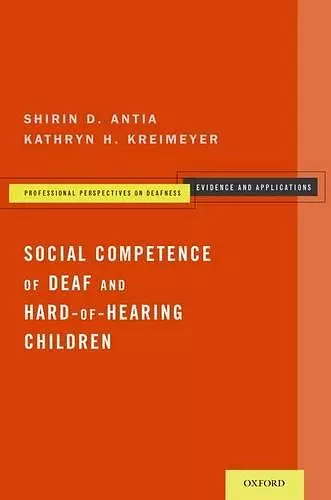Social Competence of Deaf and Hard-of-Hearing Children
Shirin D Antia author Kathryn H Kreimeyer author
Format:Paperback
Publisher:Oxford University Press Inc
Published:9th Jul '15
Currently unavailable, and unfortunately no date known when it will be back

Social Competence of Deaf and Hard-of-Hearing Children addresses the development, assessment, and promotion of social competence in children who are deaf or hard-of-hearing (DHH). Most children readily develop social competence through the mutually dependent development of social skills and social relationships. Why then write a book on the social competence of DHH children? Hearing loss, with its resulting communication challenges, has the potential to impede the development of social skills and restrict social relationships. In this volume, Shirin D. Antia and Kathryn H. Kreimeyer highlight multiple strategies that teachers, families, and community members can utilize to promote the social competence of DHH children. The authors approach this topic by first describing the development and expression of social competence in infants, as well as in preschool- and school-age hearing and DHH children. Socially competent children display a flexible repertoire of social behaviors that are appropriately utilized in varying social situations and which further children's social goals. Since social competence develops initially through interactions between infants and their caretakers, a primary consideration for children with hearing loss is that the infant and caretaker share a common communication approach to facilitate early interaction. As infants become preschool age, opportunities for interactions with other children increase and social interactions revolve around play. The development of interactive and of pretend play requires children to communicate with one another to assume roles, share fantasies, and solve social conflicts. DHH children must develop communication skills to participate in interactive play, and hearing children may need guidance to successfully engage with DHH peers. For school-age children, the importance of peer acceptance increases; DHH children need supportive situations both within and outside of school to interact with peers, develop friendships, and refine the social behaviors that promote peer acceptance. The authors present a variety of practical ways to assess the social competence of DHH children. They emphasize the role of assessment in identifying social strengths and needs to establish a basis for any necessary intervention. They then present ways to promote social competence, with a separate focus on strategies appropriate for young DHH children and for school-age DHH children. For both age groups, the authors address the role of families, professionals, schools, and communities in helping children develop the skills needed to become socially...
The book is a must read * Nina Wolters-Leermakers, Journal of Deaf Studies and Deaf Education *
ISBN: 9780199957736
Dimensions: 155mm x 236mm x 13mm
Weight: 408g
304 pages